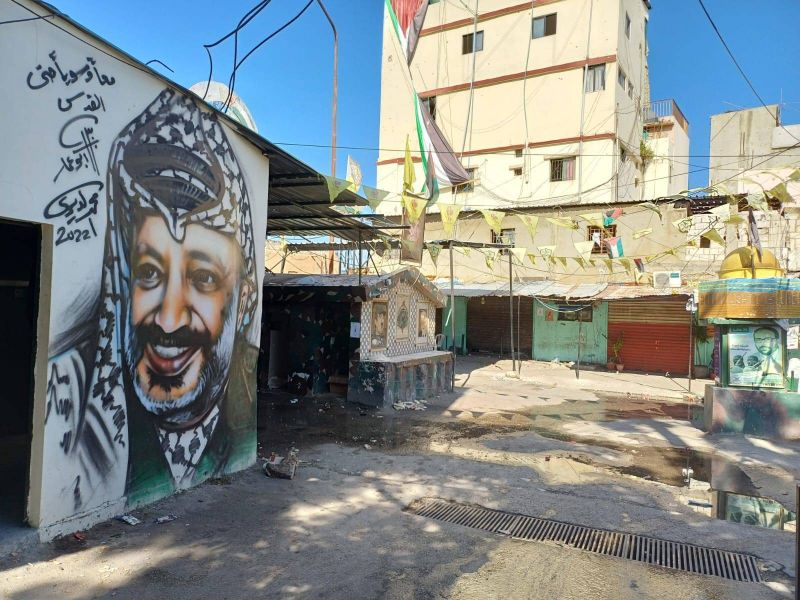
The northern entrance to the Ain al-Hilweh Palestinian refugee camp in southern Lebanon. (Credit: Mountasser Abdallah/L'Orient Today)
Want to get the Morning Brief by email? Click here to sign up.
At least 10 people were injured and hundreds forced from their homes in the Ain al-Hilweh Palestinian refugee camp just outside Saida late Thursday night, during armed clashes that continued into Friday morning, echoing similar fighting in July, Palestinian sources told L’Orient Today. The gun and grenade fire, which L’Orient Today’s South Lebanon correspondent reported was audible throughout Saida, broke out between Islamist militants and fighters aligned with Fatah, according to sources in the camp. Videos shared online showed families carrying children and their belongings to seek shelter in a mosque just outside the camp late at night. The renewed clashes came as an agreement was meant to go into effect Friday stipulating that Fatah and Islamist fighters withdraw from positions they have occupied in recent weeks in UNRWA-run school buildings inside the camp, Maher Shabaiteh, a Fatah official, told L’Orient Today. Earlier this summer, July saw the deadliest Ain al-Hilweh clashes in years between Islamists and Fatah fighters, leaving at least 13 dead and forcing some 350 families to flee the camp.
Moviegoers headed to Lebanese cinemas in droves — and in many shades of pink — as the “Barbie” film finally began screening yesterday after more than a month of delay due to controversy over a potential ban. In August, caretaker Culture Minister Mohamad Mortada asked General Security, via the Interior Ministry, to ban the film, saying it “ goes against Lebanon's moral and religious values, as it encourages perversion and gender transformation while calling for the rejection of patriarchy and ridiculing the role of mothers." Days later, however, Lebanon’s Film Censorship Committee, composed of representatives from General Security and the Economy Ministry, stated they had no reason to request banning “Barbie.”
The caretaker cabinet yesterday approved a Bloomberg-operated exchange rate platform that would replace the central bank-run Sayrafa platform. Cabinet also renewed for a third year the Iraqi fuel swap deal, which, now also benefits the Telecoms Ministry and approved the recruitment of 20 assistant air traffic controllers. Sayrafa’s successor aims for the “liberalization and unification” of the lira-to-dollar exchange rate. The central bank is thought to have used its foreign exchange reserves to prop up the exchange rate through Sayrafa — and its associated circulars, allowing depositors to withdraw funds at an exchange rate stronger than that of the parallel market. The obstacles to accessing dollars have reverberated to the energy sector, with state electricity supplier Electricité du Liban facing difficulties funding fuel shipments. Aiming to ease EDL’s woes, the Iraqi fuel agreement was renewed with an increased cap from the previous year, reaching 1.5 million tons of crude fuel that can be exchanged for fuel compatible with the utility’s power plants. The cabinet also approved the recruitment of assistant air traffic controllers after an audit report of Beirut’s airport this summer highlighted the danger imposed by air traffic control staff shortages.
The Lebanese Army announced it had halted mass irregular border crossing attempts from Syria to Lebanon for a fourth week. In a separate statement, the army announced the arrest of an alleged people smuggler organizing informal trips across the Lebanese-Syrian border. A security official told AFP that “the number of soldiers mobilized [at the Syrian-Lebanese border] is not enough,” claiming that deteriorating living conditions in Syria spurred an exodus “in the hope of finding work.” In a Wednesday night statement to the Arab League Council of Foreign Ministers, caretaker Foreign Minister Abdallah Bou Habib claimed the “increased” presence of Syrian refugees in Lebanon, which he linked to their departure for “economic and financial reasons,” caused “additional pressure” amid the countries’ compounded crises and “limited resources.” In April, amid increasingly aggressive policing and deportations of Syrian refugees in Lebanon, the government called for tighter border security and announced it would bar refugee status from displaced Syrians who had returned to Syria.
Archeological pieces illegally transported from Lebanon during the Civil War (1975-1990) were scheduled to return to the Culture Ministry yesterday, the state-run National News Agency reported. The ministry’s statement says the pieces set to be shipped free of charge by CMA CGM from New York include “a marble head from a young Roman,” excavated from Temple of Ashmun in Saida in 1971, and nine mosaic pieces which were held by Interpol-wanted antiquities collector Georges Lotfi.
In case you missed it, here’s our must-read story from yesterday: “Is tourism a miracle cure for Lebanon’s crisis?”
Compiled by Abbas Mahfouz